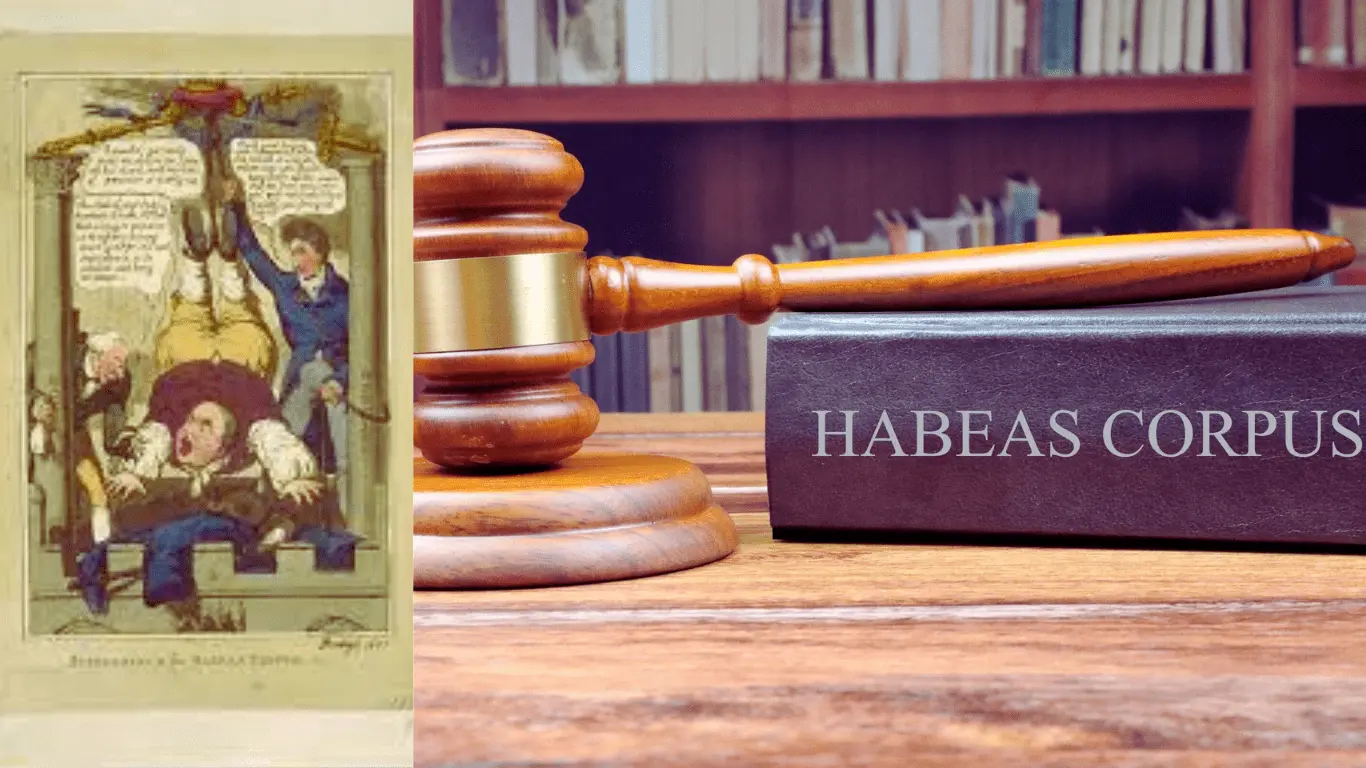Habeas corpus, literally translated from Latin as “show me the body,” is a fundamental judicial order that mandates a person holding another in custody to present the detainee in court and justify the detention. Historically, its origins trace back to the Magna Carta in England in 1215, becoming a vital part of legal processes to protect personal freedom and prevent unlawful imprisonment. The writ of habeas corpus was clearly defined by William Blackstone in the eighteenth century as a robust measure against all types of illegal confinement.
This legal instrument emerged prominently during the 17th Century in England amidst struggles for civil liberty, marking its evolution into a critical tool for safeguarding individual rights against arbitrary state action. Today, habeas corpus serves as a powerful legal recourse that ensures the lawfulness of a person’s detention and provides a pathway to release if the detention is found unjustifiable.
The Origins of Habeas Corpus
Expansion and Formalization
The evolution of habeas corpus in English law is marked by its transition from a procedural tool to a fundamental safeguard of personal liberty. Originally stemming from the Assize of Clarendon in 1166, the writ began as a basic order for the production of a detainee before a court or a judge. Over the centuries, particularly during the 17th century, habeas corpus evolved significantly amidst political and religious upheavals.
The formal recognition and expansion of habeas corpus occurred primarily during the conflicts between the English Parliament and the Crown. These conflicts underscored the need for legal mechanisms that could curb arbitrary detention and protect individual freedoms. The Habeas Corpus Act of 1679 became a pivotal moment in English law, formally codifying the procedures and protections associated with the writ, thus reinforcing it as a critical tool for ensuring the lawfulness of a person’s detention.
This expansion was crucial in shaping habeas corpus into a powerful judicial command, used to challenge and scrutinize the legality of imprisonment or detention by the state, thereby cementing its role as a cornerstone of individual liberties and judicial oversight.
Habeas Corpus Acts
The Habeas Corpus Act of 1679
The Habeas Corpus Act of 1679 was enacted by the English Parliament to address and prevent arbitrary arrests and imprisonments, thereby strengthening the legal procedure associated with the writ of habeas corpus. Key provisions of the Act included:
- Strengthening Legal Procedure: It solidified the process by which a person could challenge unlawful detentions. The Act required that a court must examine the grounds of detention and order the release of improperly detained individuals.
- Preventing Delays: It aimed to prevent sheriffs and jailers from delaying the execution of a habeas corpus writ, thus ensuring a quicker response to the writs issued by the courts.
Impact
The enactment of the Habeas Corpus Act was crucial for the development of legal protections against arbitrary imprisonment, influencing similar legal frameworks in other jurisdictions. It provided an important model that was referenced during the drafting of the U.S. Constitution, emphasizing the importance of safeguarding individual liberty through legal means.
Habeas Corpus in the United States
Constitutional Basis
The privilege of the Writ of Habeas Corpus is specifically mentioned in Article I, Section 9 of the U.S. Constitution. This section outlines the limited circumstances under which Congress may suspend the writ, stating, “The Privilege of the Writ of Habeas Corpus shall not be suspended, unless when in Cases of Rebellion or Invasion the public Safety may require it”. This provision is known as the Suspension Clause and serves as a fundamental safeguard against arbitrary detention, ensuring judicial oversight of imprisonments.
Notable Supreme Court Cases
Several key U.S. Supreme Court cases have significantly shaped the legal landscape of habeas corpus:
- Johnson v. Eisentrager (1950): This case addressed the rights of non-U.S. citizens detained abroad to file habeas corpus petitions. The Supreme Court ruled that non-citizens detained outside the United States at military facilities did not have the right to petition U.S. courts for habeas corpus.
- DHS v. Thuraissigiam (2020): This recent case involved a challenge to the expedited removal procedures for certain asylum seekers, questioning whether their exclusion from habeas corpus review was constitutional. The Supreme Court upheld the restrictions, significantly impacting the rights of refugees and asylum seekers to challenge detention.
These cases highlight the evolving interpretation and application of habeas corpus rights, reflecting broader shifts in judiciary perspectives and societal values.
Modern Use and Challenges
The War on Terror
The impact of the War on Terror on habeas corpus has been profound, altering its application and raising significant constitutional questions. Key aspects include:
- Expansion of Habeas Corpus Jurisdiction: Post-9/11, the scope of habeas corpus has been expanded and tested, particularly in cases involving terrorism suspects. The U.S. has had to balance national security concerns with civil liberties, frequently impacting the rights and treatment of detainees.
- Indefinite Detention and Judicial Oversight: The USA PATRIOT Act and subsequent legal frameworks allowed for the indefinite detention of terrorism suspects, challenging traditional habeas corpus protections. These provisions have been contentious, questioning how the law adapts in times of national crisis.
- Supreme Court Involvement: The Supreme Court has played a crucial role in defining the limits and applications of habeas corpus during the War on Terror, balancing government powers and individual rights.
These issues underscore the tension between maintaining national security and preserving fundamental judicial rights during crises.
Contemporary Challenges
Habeas corpus faces several contemporary challenges that threaten its efficacy and scope in safeguarding individual freedoms:
- Legislative and Judicial Erosion: Over recent decades, there has been a notable decline in the protective scope of habeas corpus. This decline is partly due to legislative actions and judicial decisions that limit the ability of prisoners to challenge their detention, particularly in contexts such as the war on terror or high-security incarcerations.
- Practical Inefficiencies: The administration of habeas corpus has also been critiqued for its inefficiencies and the increasing complexity of its legal processes, which can delay justice for many who seek relief under the Great Writ.
These challenges highlight the ongoing struggle to balance national security and public safety with the preservation of fundamental civil liberties.
International Perspective
Comparison with Other Nations
The application and interpretation of habeas corpus can vary significantly between countries:
- Continental Differences: Most continental jurisdictions possess a legal remedy similar to habeas corpus for addressing illegal deprivation of liberty, though these can substantially differ in form and execution compared to the Anglo-American tradition.
- Usage in the United States and the United Kingdom: In the Anglo-American legal system, habeas corpus has historically been a versatile tool used extensively to address unlawful detentions. However, its application shows notable versatility, adapting to different legal and social challenges over time.
- International Perspective: The principle of habeas corpus is recognized in international human rights law, suggesting a broad acceptance of its importance across different legal systems.
- Commonwealth Countries: The principle has also evolved uniquely in different Commonwealth countries, adapting to local legal contexts while maintaining a core commitment to preventing unlawful detention.
These comparisons illustrate both a shared commitment to the fundamental principles of habeas corpus and the diverse ways in which different jurisdictions implement these principles.
The Importance of Habeas Corpus
Protecting Liberty
The writ of habeas corpus is a crucial judicial mechanism that serves to protect individual freedoms by enabling courts to review the legality of a detainee’s imprisonment. It stands as a defense against arbitrary and unlawful detention, ensuring that no person can be held without just cause. Here’s how it safeguards personal freedom:
- Preventing Arbitrary Detention: Habeas corpus provides a direct means to challenge unlawful detentions, thereby preventing the state from holding individuals without a valid reason.
- Judicial Review: It allows the judiciary to check on executive actions, ensuring that incarcerations are not only lawful but also just and fair.
- Protection under the Constitution: In the U.S., habeas corpus is enshrined as a fundamental right under the Constitution, underscoring its importance in maintaining civil liberties.
- Historical Significance: The historical roots of habeas corpus demonstrate its long-standing role in curbing government overreach and protecting individual freedoms from unjust imprisonment.
Implications for Justice
The writ of habeas corpus has profound implications for the justice system, particularly in ensuring fairness and legal accountability. Here are some of the key impacts:
- Checks and Balances: Habeas corpus serves as a critical check on the judiciary and executive branches, preventing the misuse of power in the detention of individuals. It offers a method for the judicial review of detention and imprisonment, ensuring that these actions are legally and ethically justified.
- Protection of Individual Rights: It upholds the principle that no one should be deprived of liberty without due process. By allowing detainees to challenge their detention, habeas corpus directly protects individual rights against arbitrary state action.
- Influence on State Courts: Habeas corpus applications often bring about scrutiny of state court decisions by federal courts, promoting a uniform application of justice and adherence to constitutional standards across different jurisdictions.
- Impact on Legal Precedents: The continuous evolution and interpretation of habeas corpus contribute to the development of legal precedents that influence broader judicial practices and principles, particularly concerning human rights and the treatment of detainees.
- Tension and Reform: The use of habeas corpus has generated debates over judicial reach and effectiveness of the justice system, sometimes leading to legal reforms to balance state powers and individual freedoms.
Conclusion
Habeas corpus is more than just a legal term; it is a pivotal element of democratic societies that upholds the balance between authority and individual rights, ensuring that liberty is not a casualty of convenience.
Read also: What is a Canuck?




